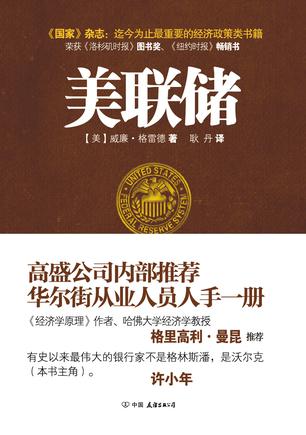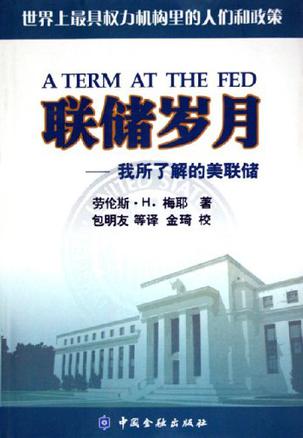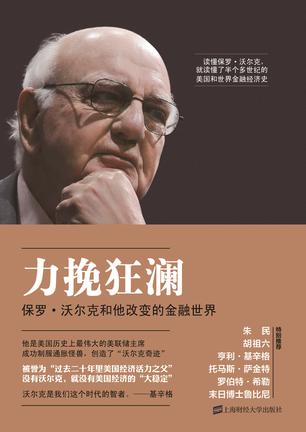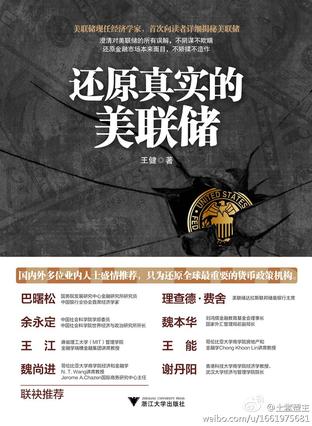欢迎来到相识电子书!
标签:美联储
-
Secrets of the Temple
This ground-breaking best-seller reveals for the first time how the mighty and mysterious Federal Reserve operates -- and how it manipulated and transformed both the American economy and the world's during the last eight crucial years. Based on extensive interviews with all the major players, Secrets of the Temple takes us inside the government institution that is in some ways more secretive than the CIA and more powerful than the President or Congress. Excerpt. © Reprinted by permission. All rights reserved. Chapter 1 THE CHOICE OF WALL STREET In the American system, citizens were taught that the transfer of political power accompanied elections, formal events when citizens made orderly choices about who shall govern. Very few Americans, therefore, understood that the transfer of power might also occur, more subtly, without elections. Even the President did not seem to grasp this possibility, until too late. He would remain in office, surrounded still by the aura of presidential authority, but he was no longer fully in control of his government. The American system depended upon deeper transactions than elections. It provided another mechanism of government, beyond the reach of the popular vote, one that managed the continuing conflicts of democratic capitalism, the natural tension between those two words, "democracy" and "capitalism." It was part of the national government, yet deliberately set outside the electoral process, insulated from the control of mere politicians. Indeed, it had the power to resist the random passions of popular will and even to discipline the society at large. This other structure of American governance coexisted with the elected one, shared power with Congress and the President, and collaborated with them. In some circumstances, it opposed them and thwarted them. Citizens were taught that its activities were mechanical and nonpolitical, unaffected by the self-interested pressures of competing economic groups, and its pervasive influence over American life was largely ignored by the continuing political debate. Its decisions and internal disputes and the large consequences that flowed from them remained remote and indistinct, submerged beneath the visible politics of the nation. The details of its actions were presumed to be too esoteric for ordinary citizens to understand. The Federal Reserve System was the crucial anomaly at the very core of representative democracy, an uncomfortable contradiction with the civic mythology of self-government. Yet the American system accepted the inconsistency. The community of elected politicians acquiesced to its power. The private economy responded to its direction. Private capital depended on it for protection. The governors of the Federal Reserve decided the largest questions of the political economy, including who shall prosper and who shall fail, yet their role remained opaque and mysterious. The Federal Reserve was shielded from scrutiny partly by its own official secrecy, but also by the curious ignorance of the American public. It was in midsummer of 1979 when this competing reality of the American system confronted the President of the United States and discreetly compelled him to yield. Jimmy Carter, in the third year of his Presidency, was engulfed by popular discontent and declining authority. The public that first embraced the simple virtues Carter expressed in his gentle Georgia accent -- earnest striving and honest, open government -- was by then overwhelmingly disenchanted with his management. Despite its accomplishments, the Carter Presidency had come to stand for confusion and inconsistency. His stature was diminished by a series of ill events, from failed legislation to revolution in Iran. A Gallup poll asked Democrats whom they would prefer as their party's nominee in 1980 and they chose Senator Edward M. Kennedy of Massachusetts over the incumbent President, 66 to 30 percent. In early July, Jimmy Carter set out to restore his popular support. The political crisis had been developing for many months but was now dramatized by the President's own behavior. He scheduled an address to the nation on energy problems, then abruptly canceled it and, somewhat mysteriously, withdrew from the daily business of the White House. He and his closest advisers gathered in private at Camp David, the presidential retreat in the Maryland mountains. For ten days, the President remained there in isolation, conducting earnest seminars on what had gone wrong with the Carter Presidency and, indeed, what had gone wrong with America itself. A stream of influential visitors was summoned to the President's lodge to offer advice. They were diverse opinion leaders from politics, education, religion and other realms, and their talk skipped across the landscape of American life. In his methodical manner, Carter filled a notebook with their comments. Each day, the press speculated extravagantly on what the President intended to do. On Saturday, July 14, the isolation ended and Jimmy Carter returned to the White House. The next evening, more than two-thirds of the national audience gathered before their television sets to hear his report. After two and a half years, Carter's unusual mannerisms were familiar to the public, the rising and falling cadences that sounded like a Protestant preacher, the cheerful smile that sometimes oddly punctuated stern passages. This speech was different, more somber in tone, more desperate in content. The President began with a startling ritual of confession -- revealing excerpts of the private criticism he had collected at the Camp David meetings. "Mr. President," a southern governor had told him, "you are not leading this nation -- you are just managing the government." Others' comments were equally critical. "You don't see the people enough anymore." "Don't talk to us about politics or the mechanics of government, but about an understanding of our common good." "Some of your Cabinet members don't seem loyal. There is not enough discipline among your disciples." "Mr. President, we are in trouble. Talk to us about blood and sweat and tears." A religious leader had told him: "No material shortage can touch the important things like God's love for us or our love for one another." Carter said he especially liked the comment from a black woman who was mayor of a small town in Mississippi: "The big shots are not the only ones who are important. Remember, you can't sell anything on Wall Street unless someone digs it up somewhere else first." The President was candid about his own shortcomings as a political leader: "I have worked hard to put my campaign promises into law -- and I have to admit, with just mixed success." The present crisis, however, was not really a matter of legislation, Carter declared. America faced a crisis of the soul, a testing of its moral and spiritual values. "The threat is nearly invisible in ordinary ways," the President warned. "It is a crisis of confidence. It is a crisis that strikes at the very heart and soul and spirit of our national will. We can see this crisis in the growing doubt about the meaning of our own lives and in the loss of a unity of purpose for our Nation." Spiritual distress was an abstraction, but the source of America's political discontent was actually quite tangible. It was the lines at gas stations that made people angry and gasoline at $1.25 a gallon. It was the constantly rising prices on supermarket shelves, prices that seemed to change every week and always higher. In the spring of 1979, after the revolutionary upheaval in Iran had interrupted its oil production, the cartel of oil-producing nations, OPEC, had seized the opportunity of temporary shortages to raise world petroleum prices again. OPEC, which had roughly quadrupled oil prices during its embargo of 1973-1974, more than redoubled them through 1978 and 1979. This second "oil shock," as economists called it, automatically fed price increases into nearly every product, every marketplace where Americans bought and sold. The latest oil-price shock, moreover, occurred at an especially bad time, when the inflation rate in the United States was already abnormally high. In the first three months of 1979, the government's index of consumer prices, covering everything from food to housing, had risen at an annual rate of nearly 11 percent. In a year's time, a dollar would buy only 89 cents' worth of goods. A $6,000 car would soon cost $660 more. And every wage earner would need a pay raise of more than 10 percent simply to stay even with prices. Through the second quarter of 1979, April to June, as the OPEC price increases took hold, the inflation rate had worsened, reaching 14 percent. By early summer, motorists in some regions were once again waiting in line at gas stations and Jimmy Carter's political popularity had reached a dangerously low point. In July, according to public-opinion polls, barely a fourth of the voters approved of his performance as President. Carter and his advisers hoped that the dramatic speech, followed by swift and decisive actions, would turn things around. His message was daring. In similar circumstances, a different political leader might have blamed the economic distress on others -- on an easily recognized villain like the Arab nations of OPEC or the multinational oil companies -- and deflected Americans' resentment toward them. But polarizing politics, the technique of "us against them," was not Carter's style. Instead, he asked the people to blame themselves, just as he had done. The speech did outline an ambitious six-part energy program, designed to overcome the nation's dependency on imported oil. But the central message, the one most citizens would remember, was a critique of their own materialism: In a nation that was proud of hard work, strong families, close-knit communities and our faith in God, too many of us now tend to worship self-indulgence and consumption. Human identity is no longer defined by what one does, but by what one owns. But we have discovered that owning things and consuming things does not satisfy our longing for meaning. We have learned that piling up material goods cannot fill the emptiness of lives which have no confidence or purpose. The President called the country to sacrifice and spiritual renewal. He asked his audience for cooperative self-denial, to forgo the excesses of material pleasures in the national interest. Carter's speech did not even mention the Federal Reserve and its management of money, the government's handle on interest rates and credit expansion by which Washington ultimately influenced both p... -
美联储
威廉·格雷德编写的《美联储》是一本开创性的畅销之作!记录了保罗·沃尔克任职美联储主席的8年中,强势扭转美国被通货膨胀吞噬的命运,奠定了迄今为止世界经济形态的基础。《美联储》在对最顶级经济玩家大量采访的基础上,第一次带领我们深入了解这个在某些方面甚至比中央情报局更机密、比总统和国会更强大的神秘机构。 -
美联储的秘密
本书于1952年由纽约伯和霍顿出版社社初版,首次披露了国际银行家于1907-1910年在佐治亚州的杰基尔岛召开的秘密会议,然而1913年出台的《联邦储备法案》并非如人们所想象的神圣而不可侵犯,所谓的“联邦储备体系”实际上既不是联邦层面的,它也没有储备,因此并不能称为一个体系。本书的面世,廓清了长久以来那些联邦银行家的种种阴谋与其刻意制造的神秘色彩,既是揭示“美联储之谜”的开山之作,也是迄今为止最权威的核心文献。 -
联储岁月
2001年9月9日清晨,作为财政部部长保罗·奥尼尔所率领的美国代表团中联储的代表,我来到了中国。这将是我对中国的最后一次官方访问,我让我的妻子陪在身边,这样我就可以与她分享我在这个伟大国度里的激动心情。 在一次简短会见中,奥尼尔部长和我拜会了中国国家主席江泽民。之后,我们抵达了北京的国际俱乐部酒店,它坐落在北京使馆区一条安静的林阴道上。次日,我们与我们的中国同行们进行了整整一天的讨论。 中国财政部项怀诚部长首先致辞,奥尼尔部长随后发言。然后,美国财政部副部长约翰·泰勒和我主持了对一些当前问题的讨论。中国人最感兴趣的是如何扩大本国的资本市场,改善其银行体系中的缺陷以及国有企业改革。他们想知道我们是如何监管银行的,美国的证券市场是如何对银行体系起到补充作用的,以及我们是如何对资本市场的活动进行监管的。 这个社会主义国家如此认真地对待资本主义体制令我十分震惊。中国人非常实际。他们向我们征询意见,在他们的情况下会怎么做?他们十分坦诚和直率。 会议结束后,奥尼尔部长赴日本访问。我和我妻子留在了北京,在那儿我又和一些中国的学者和该国智囊机构的经济学家们进行了一天的讨论。其后,我和妻子计划游览一些当地名胜。去游长城令我尤为兴奋。我曾四次访问中国,但从没见过长城,所以这次访问我决心要去一次。会议结束时,在大使官邸举行了一次简短的招待会,那儿距饭店仅一步之遥。我和妻子就步行回国际俱乐部酒店。我们本想一起安安静静吃顿晚饭。当时正好快到北京时间晚上九点,是纽约时间9月11日上午九点。 按我们在国外旅行的习惯,我们打开CNN看看美国和世界其他地方发生了什么事。当我第一眼看电视屏幕时,我看见世贸中心北楼在冒烟。播音员的语气那时还没有满怀感情,只是在分析情况。他们对发生的情况有点摸不着头脑。好像是架小飞机,因导航系统失灵撞上了世贸中心。我把我妻子叫过来看。 随后,我们当场目击了可怕的一幕,就是第二架飞机撞进南楼的一刹那。评论员并没能马上把这两次撞击联系到一起,但很快就清楚这两次撞击是一回事。这是一次有预谋的行动,这也不是小飞机误撞了大楼,而是大型喷气客机被当成武器来打击美国资本主义的象征。 我的第一反应不是我作为货币政策决策者应该发挥的作用,而是失去的生命和被悲痛击倒的亲人。但很快我就意识到,联储将会有很多工作要做。 尽管世贸中心双塔还没有倒塌,但我马上开始担心,因为世贸中心里有许多金融机构。其他一些机构也相距不远:纽约联邦储备银行以及几家国内较大的清算银行就在几个街区之外。如果这些大楼遭到破坏或摧毁,支付体系将会怎样? 很明显,必须制订计划并考虑政策对策。但我人在北京,情况越来越明了,我要解决的第一个问题是如何回家。 我接通了在华盛顿的理事会,与罗杰·弗格森副主席通了话。可笑的是,他是惟一一位在华盛顿的联储理事,其他的理事们都在国内或海外旅行。格林斯潘主席在巴塞尔。得知消息后,格林斯潘主席搭乘了一架军用飞机赶回国内,由于这架货机只在尾部有吊床可坐,他是坐在副驾驶的位置上回到华盛顿的。 -
力挽狂澜:保罗•沃尔克和他改变的金融世界
◎ 入围“FT/高盛年度商业图书奖”,金融行业必读 ◎ 亨利·基辛格、朱民、胡祖六、诺奖得主托马斯·萨金特、耶鲁大学金融学教授罗伯特·希勒、末日博士鲁比尼、英格兰银行行长默文·金、亨利·考夫曼等特别推荐 ◎ 《纽约时报》《华尔街日报》《金融时报》《经济学人》等权威媒体强烈推荐,《彭博-商业周刊》评为年度最佳商业图书,《华盛顿邮报》提名为年度杰出领袖图书 ★ 许小年:有史以来最伟大的银行家不是格林斯潘,是沃尔克。 ★ 亨利·基辛格:沃尔克是我们这个时代的智者。 历任当代央行行长中,最知名的或许是艾伦·格林斯潘,但最有影响力的则是保罗·沃尔克。他辉煌传奇的职业生涯无人可及:被六任总统委以重任,受命于危难,三次应对金融危机;连任两届美联储主席,成功驯服高达两位数的通胀怪兽,创造了“沃尔克奇迹”,为美国此后的二十年经济增长“大稳定”奠定了稳固基础。 ★ 朱民:沃尔克在美国以及国际上的崇高地位不仅因为他曾经担任美联储主席,更重要的是他的正直、良心、道德和责任感。 ★ 胡祖六:在与沃尔克多年的交往接触中,令我最钦佩、最敬重的是他的人格。他自始至终坚持了自己的理念、独立的人格与忠于公共利益的精神。 沃尔克坚持自己的信念、原则和职业道德,绝不迎合任命他的总统。其成就无人比肩,其贡献之广,远超金融一个行业。沃尔克作为政府官员,一生投入于公职,放弃投资银行提供的高薪,过着算得上是清贫的生活,其高贵、正直和独立的品格倍受世人敬重。 ★ 托马斯·萨金特:威廉·西尔伯引人入胜地讲述了一个关于理论和人性如何影响公共政策与经济成效的故事。本书以小说似的语言,再现了沃尔克战争通胀的经历。 《力挽狂澜》串连起沃尔克辉煌传奇的从业经历,宏大而生动,更披露了有趣的生活细节,使得这位金融巨人的形象格外立体饱满:虚心地跟上司学习穿着;做事喜欢“拖”,不到最后一刻不发力;不善言辞的他,要靠贤内助应酬社交;50多岁担任美联储主席时,只身一人在华盛顿租住大学生公寓;爱垂钓,许多人生重大决定也是在钓鱼过程中做出的…… 本书对货币政策和国际金融的讲解老到娴熟又精妙入微,金融界人士可以过足了瘾。大众读者也得以走进一段风云激荡的金融传奇,走近一位可敬可爱的金融英雄。 -
美联储货币政策史
本书详细纪录了从美联储成立之初到格林斯潘时代终结之时的美国货币政策的演变过程,评析了该过程中学术和政治环境变化的来龙去脉。书中详解了金本位制与信用货币之间的更替过程,也反映出货币政策的实施就像是用于解答货币和价格的基本问题的一系列实验:20世纪周期性的货币动荡如何引起经 济动荡以及与之相关联的政治和社会动荡?等一系列问题。通过本书,我们可以更深刻地了解现代央行的兴起与本质。 本书论述内容丰富,分析到位深刻,并且能够结合我国当前实际情况进行具有一定前瞻性的分析,具有很高的学术价值意义。同时,本书紧扣时代主题,紧扣中国经济发展脉络,具有很强的前沿性、创新性和系统性。 “观察货币政策与经济的互动,美联储无疑提供了最佳的样本。《美联储货币政策史》不仅覆盖时期长,经济史料也非常丰富,是一本不可多得的佳作。” ——李扬 中国社科院原副院长、国家金融与发展实验室理事长 “从金本位向信用本位过渡,是影响过去一百年货币体系和货币政策变迁最重要的事件。美联储的经历,恰好反映了人们在这一历史时期,对于货币政策理论和实践的不断探索。《美联储货币政策史》为我们更好地了解货币政策体系的演进过程及其背后的逻辑,提供了不可多得的素材。” ——黄益平 中国人民银行货币政策委员会委员、北京大学国家发展研究院副院长 "许多人有一错觉,就是认定人类社会历来就有央行主导货币发行和宏观调控。他们没想到央行只是现代现象,人类历史长河中大多数时期既没有央行也没有宏观调控。美联储围绕货币政策的讨论历史可以清晰地告诉我们这一点,并帮助我们更好地把握央行,把握住看得见的手。" ——陈志武 耶鲁大学金融学教授 -
还原真实的美联储
作为美国最高货币政策主管机关、全球最主要金融机构之一的美联储, 究竟是不是私人机构,股东是谁,利润如何分配? 谁负责制定美联储的政策? 它是否真像传说中那样可以在金融市场上呼风唤雨? 它又如何在金融危机时力挽狂澜,维持金融市场稳定? 量化宽松政策真的是美联储在滥发货币转嫁危机吗? 美国经济复苏后,美联储如何从现行政策中全身而退,又会对全球金融市场造成什么影响? 本书不仅对美联储的历史背景、政策目标、组织架构和运行机制作了客观明确的描述,而且对国内读者特别关心的有关美联储的各个问题进行剖析,提出了独到的见解;在澄清若干对美联储的常见误解之后,我们可以进一步了解美联储在全球经济和金融市场上的作用及其行事逻辑,从而进一步增强对全球市场的预见能力! -
我在美联储监管银行
本书作者以在美国联邦储备系统纽约联储银行工作的亲身经历,描述了美联储在执行银行监督管理方面的各种细节。书中穿插了个人的所见所闻和认知感受。本书集知识性、故事性和趣味性于一体,为广大读者了解美联储系统和金融界,尤其是纽约联储和华尔街,提供丰富的第一手的理性和感性资料。读者还可以从书中看到一个留学生的成长经历和一个职业人士的心路历程。 本书是金融相关专业人士和高校学生的重要高端参考书。同时对于爱好金融的普通大众,也是一本轻松有趣的普及读物。更可贵的,这还是一本不可多得的成功励志读物。 媒体评论 金融、华尔街、美联储监管,这一切在人们的眼中显得有些高深和神秘,让人望而生畏。但读一读《我在美联储监管银行》,既能让一般读者对银行监管有一个清晰的了解,又能为专业人士进一步了解美联储的银行监管理念、操作程序和运行机制提供一个完整的框架。作者的经历和为人处世的准则无论对求学之人和对专业人士都会有所启迪。 我建议想了解金融、了解监管的人读读这本书。也许作者的语言不符合国人含蓄的传统,但这也是作者个性的体现,瑕不掩瑜。 ——中国人民银行副行长 吴晓灵 《我在美联储监管银行》以一位经济学家的视野,围绕新巴塞尔资本协议制定、花旗集团合并、纽约联储监管机制的运作等核心内容,详细介绍了作者 1998年至 2001年在美国纽约联储从事银行监管的亲身经历和所思所想,是我国金融业者了解国际同业运作经验的难得的参考书。 ——中国人民银行行长助理 易纲 作者在美联储工作期间所亲历的美国20世纪80年代重大金融变革正是今年中国银行业面临的课题。书中描述的美联储监管的运行机制、行为准则以及对重大变革事件的处置,可以使我们今天在探索中国银行改革和发展路径中获得许多有益的启发。它山之石,可以攻玉,这是一本不可多得的好书。 ——招商银行行长 马蔚华 在上世纪末本世纪初的国际银行业的大变革时期,本书作者在美联储从事银行监管工作。她用流畅的笔精心地、生动地描绘了她在此期间经历的银行监管的实践。 面对中国的银行的重组、上市,中国的银行监管也在不断走向规范。本书为银行监管者和管理者提供了及时的、有益的参考资料。 ——清华大学经济管理学院院长,美国伯克利加州大学经济系教授 钱颖一 美联储对银行业的监管可谓各国银行监管的典范。卢菁博士以自己在纽约联储的切身经历写成这本书,在大量第一手资料的基础上,用形象生动的语言和简洁的理论模型,将复杂的监管程序和与时俱进的监管政策娓娓道来,理论与实践浑然一体,读来令人身临其境,耳目一新。我相信本书对完善中国银行业的监管体制和金融创新有着重要的参考价值。 ——北京大学光华管理学院院长 张维迎 和一般的经济学家不一样,卢菁有在国际金融界和监管机构长期工作的实战经验;同时,和一般的实际操作者不一样,她又有在大学进行长期研究积累的学术功底。她在这本书里从政府监管者和学者的角度记载了上世纪末本世纪初美国银行界修改巴塞尔协议的过程以及她亲身参与的一些重要案例。她生动、务实而深入的描述对正在和国际接轨的中国银行界和监管机构有重要的参考价值。 ——上海中欧国际工商学院荷兰银行风险管理讲席教授, 原美国明尼苏达大学卡尔森管理学院金融学教授 张春(Chun Chang) 这是一本难得的佳作。作者有经济学博士学位,又在加拿大高校里执过教,随后在美国中央银行做过银行监管,所以此书的一大特点就是既有监管银行的第一手实例,又不缺理论功底。此书的第二大特点就是可读性非常强。作者从内情人的角度,恰当地融入了亲身经历的种种小故事,用形象感性的语言,把抽象枯燥的美联储银行监管的运行机制和行为准则,生动精练地表达出来。这种写法,贯穿于全书。除了银行监管的知识之外,读者还可以从此书中读到华尔街的金融风貌,留学生的奋斗历程和职场人士的积极进取。潜移默化之中,读者可以领悟到作为一位国际化的人才需要何许素质。我很高兴能把这本我欣赏的书推荐给读者。 ——国际货币基金组织研究部助理主任, 美国国民经济研究局中国经济项目主任,美国哥伦比亚大学管理学院教授 魏尚进
热门标签
下载排行榜
- 1 梦的解析:最佳译本
- 2 李鸿章全传
- 3 淡定的智慧
- 4 心理操控术
- 5 哈佛口才课
- 6 俗世奇人
- 7 日瓦戈医生
- 8 笑死你的逻辑学
- 9 历史老师没教过的历史
- 10 1分钟和陌生人成为朋友








